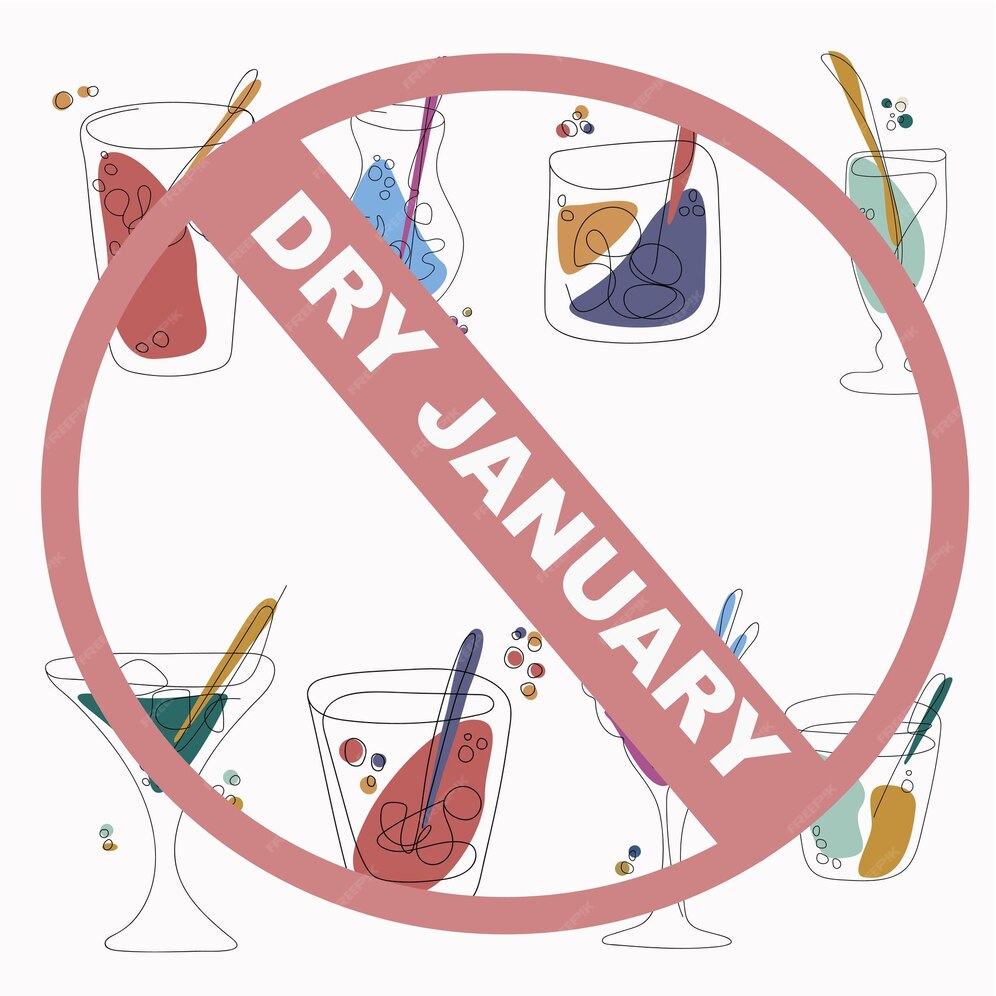Should I Try “Dry”?: A Quick Dive into the Benefits of Dry January



The new year is fast approaching and with it brings the promise of a fresh start and the exciting prospect of change. For many of us this offers an opportunity and a chance to redefine ourselves- to break away from habits that do not serve us and embrace new ones. Nothing feels more empowering than taking our mental and physical health into our own hands.
One such transformative habit that has gained immense popularity and momentum is the concept of Dry January.
What is Dry January?
Dry January seems new and trendy but it actually has roots stemming back to World War II (1942). That’s right, more that 80 years ago! More recently, a challenge in the UK took off when people decided they wanted to abstain from alcohol for 31 days. The idea was that this time would allow the body to “detox” from the indulgences of the holiday season and provide time for the mind to “reset”. Almost as if we get a chance to start the new year with a “blank slate”. This period of time serves as an ideal opportunity to reflect on our relationship with alcohol and explore the benefits of abstinence.
If I Want to Try “Dry”, Does That Mean I Have a Problem?
Nope! Simply participating in Dry January is not an indicator that you have a problem with alcohol. In fact, more and more individuals are choosing not to drink just because it makes them feel good. However, having a Dry January does provide a valuable opportunity to reflect on how alcohol consumption affects your wellbeing.
Here are just a few indicators that might be a sign of more problematic use:
- Drinking more than intended on your own or at events
- Not being able to slow down or stop, even when you try
- Giving up or not being able to perform certain responsibilities because of drinking (or effects of drinking, like hangover or fatigue)
- Needing to stave off a hangover with “the hair of the dog”
- Problems with relationships, work, or school because of drinking
- Consuming increasing amounts in one sitting or across a period of time, like a week
If you or someone you know exhibit any of the above, it might be a sign of a more serious problem. While Dry January might be a great start, individuals who are experiencing problem drinking often need support, resources, and a helpful community to make sustainable change.
How do I do ‘Dry January’?
As of January 1, 2024 the idea is to completely abstain from all alcohol. Most people need to take some steps to be successful. If you are someone who typically enjoys a glass of wine with dinner, have a different beverage choice that feels rewarding ready and available. If you like to go out on the weekend and grab a drink with friends, maybe have a planned substitute activity or mocktail in mind before you head out. Check out some other helpful tips below:
- Have a clear and measurable goal – Are you completely abstaining for 31 days?
- Ask for support from friends and family – Ask them to join you! Social Support = Success!
- Avoid triggers that may make you want to drink – certain times of day, places, situations, emotions, songs, etc.
- Find a substitute “go-to drink” for social situations – Maybe you want sparkling water with a wedge of lemon or lime, a special mocktail, soda, etc.
- Remember that “no” is a full sentence – if someone asks you or pressures you to drink, you do not have to explain yourself. “No” is a full sentence and you do not owe anyone an explanation about why you aren’t drinking unless you care to share that information
- Be sure to reward yourself for your achievements – big and small
- Be kind and compassionate with yourself – Anytime we are making a change, we can expect slip ups and mistakes to happen. Learn from it, acknowledge it, remember why you started, then move on.
Dry January can extend beyond 31 days and oftentimes, many people choose to keep it going! There is nothing wrong with that! I say go for it…do what works for you!
What if I slip up?
Don’t let one, or even several, slip ups ruin the experience (or experiment) for you. Change is hard. Change is fluid, not linear. Slip ups and mistakes happen and to be successful we must accept this..The most important thing is, if Dry January is your goal, find a way to get back on track. Maybe consider why you wanted to participate in Dry January in the first place- what is the motivation behind these 31 days? Allow yourself some grace and compassion, don’t beat yourself up over it.
How do I Socialize Without Alcohol?
It might feel weird or awkward at first, but if you feel the need to hold a drink in your hand when you are socializing, then make sure you have a “go-to” alcohol-free drink that you feel comfortable ordering. There are a lot of beverage options available that do not contain alcohol. There are also many new creative and delicious mocktails that have become widely popular. If you are at a bar, any skilled bartender can turn your favorite drink into a mocktail. If you are starting to notice a reliance on alcohol to feel comfortable in social situations, then that is helpful information. Maybe you are learning about some anxiety that the alcohol has been assisting with, otherwise known as “liquid courage”. Throughout this process, you may begin to have new patterns, thoughts and emotions come to your awareness. Additionally, sober bars and events have gained popularity and are starting to pop up in more and more locations. If this may be of interest to you, perhaps see if one is located in your area and pay one a visit. Being alcohol free doesn’t mean that you have to be a hermit for 31 days.
Need a Motivational Boost? Here are Some Benefits of Dry January…
The benefits of participating in Dry January are countless and include both physical and mental benefits.
Physical Benefits
Studies have shown that abstaining from alcohol, even for the short duration of a month, can lead to improved sleep quality, increased energy, weight loss, and improved organ function (such as the liver). Data also suggests that refraining from drinking can lead to reduced blood pressure, lower cholesterol levels, and even reduced levels of cancer-related proteins in the blood.
Mental Benefits
People who have participated in Dry January in the past have indicated that they feel happier, more confident, and more in control of their alcohol consumption and drinking habits. And, as an added benefit, people also shared that they were able to find new ways to spend time with friends and family and socialize that did not involve alcohol. Others have recalled how they were able to share deeper and more meaningful connections with friends and family and feel more present.
Conclusion
As we stand on the cusp of a new year, filled with hope and anticipation, let’s consider embracing the change that Dry January offers. It is so much more than giving up alcohol for a month; it is about starting the year on a positive note, setting the tone for the months to follow and taking control of our health, habits, and most importantly, our lives. Who knows…this one small change could be the catalyst for a year of transformation!
If you think you or a loved one may have a problematic relationship with alcohol, help is available. Contact Monarch Behavioral Health to speak with one of our specialists. And check out this cool AA meeting finder!

Write a Comment